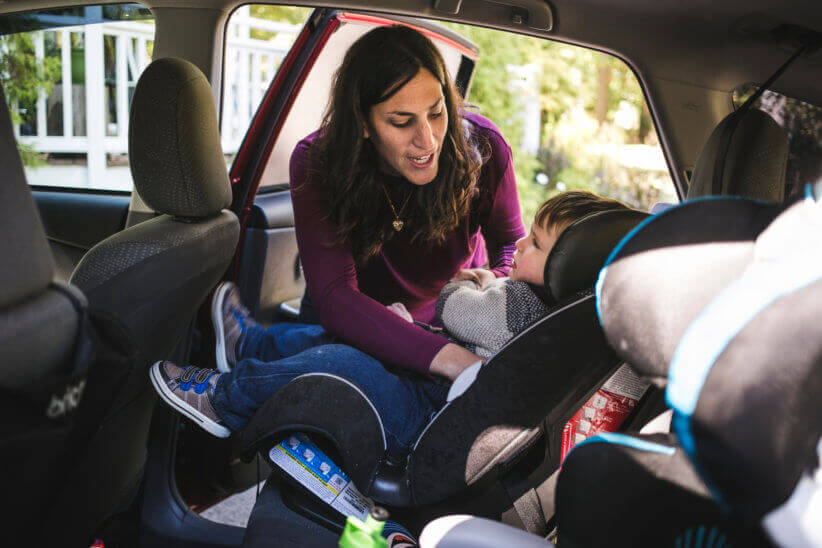It’s a rule nearly every parent breaks. The American Academy of Pediatrics recommends that children under two have no exposure to screens. That guideline was hard enough to follow when it applied to background TV and baby videos. Now that very young children are reaching for smartphones and tablets, most parents hand them over sooner or later.
Some experts argue that these screens are different because they are interactive. When a little child pokes the screen, something exciting happens. There’s no question that this kind of cause and effect is mesmerizing, but is it good for little brains?
The honest answer is no one knows, because there hasn’t been time to do the relevant research.
What scientists do know is that baby brains grow dramatically. At birth, each baby brain cell has about 2,500 synapses or connections to other brain cells. Around age 3, the typical brain cell has 15,000 connections because of the baby’s astonishing ability to learn. The A.A.P. argues that there’s no reason to take chances with that development. Even if there’s no evidence that screen time is bad for baby brains, there’s also no evidence that it does anything to promote healthy growth.
In some ways, this mirrors the conversation about sugary foods. Parents know candy and cookies aren’t necessary for growth. And, in large quantities, they displace other essential nutrients. Yet, sooner or later, most parents introduce kids to the pleasures of lollipops and birthday cake. Depending on how it’s done, the child may accept these foods as occasional treats, or he may whine for candy every time he finds himself in a checkout aisle.
Until we have evidence that screen time is good for babies and toddlers, access to technology should be limited and thoughtfully supervised by parents. Since you can’t see what’s happening in your baby’s brain, you’ll need other indicators to be sure development is on track.
Here are a few questions worth asking:
• Is your child excited to play with you? Experts agree that a deep connection with parents is crucial during the first two years of life. Early interactions in which children learn to make and break eye contact or to take turns making sounds become the foundation for emotional intelligence. Having face-to-face fun with your baby sets up a lifelong assumption that interacting with people is rewarding for its own sake.
• Do people talk to your child — a lot? Research done in the 1990s demonstrated that babies who hear around 2,000 words per hour do better in school and even have higher IQs. That’s because the language centers of the brain are especially absorbent during the first three years. Recorded words don’t make much of an impression. Language needs to be tailored to the child, responsive both to what she is doing and her emotions. Parents, of course, aren’t the only ones who should be talking to babies. Be sure other caregivers are aware of how important it is to use language with children who seem like they are too young to understand.
• Does your child enjoy three-dimensional play? Babies and toddlers figure out the world by picking things up, chewing on them, poking, throwing, rolling, and stacking them. Not only is this fun, but it gives your child the basis for concepts like round and flat, fuzzy and smooth. A touch screen may reference these ideas, but it takes lots of real life experience to get them fixed firmly in the brain. Healthy babies are always reaching and exploring. Most of what they find should stimulate multiple senses.
• Can your child detach from the screen? Some parents report that little ones become fixated on smartphones and tablets, whining for them and melting down when parents take them away. According to Michael Rich, director of Boston’s Center on Media and Child Health, this occurs because the visual stimuli gives children a regular squirt of dopamine, a brain chemical that creates sensations of pleasure. Too much of this can create cravings that babies — and sometimes older people — can’t resist.
• Is your child able to settle down for quiet time and sleeping? Because baby brains are growing so rapidly, they can easily become overstimulated. Being able to settle and sleep peacefully is a lifelong skill, and most parents intuitively help little children calm down by gentle rocking, singing, and stroking. Research indicates that the light emitted by screens stimulates brain waves in ways that interfere with sleep, so screentime should never be part of a baby’s bedtime routine.
If you can answer “yes” to all of these questions, you can be confident that your baby’s brain is getting what it needs. Under those circumstances, handing over the smartphone to secure a moment of quiet isn’t any more harmful than offering a cookie for the same reason. Neither is likely to undermine healthy development for your baby, unless you turn it into a habit.
Carolyn Jabs raised three computer-savvy kids, including one with special needs. She has been writing Growing Up Online for 10 years, and is working on a book about constructive responses to conflict. Visit www.growing-up-online.com to read other columns.
Copyright, 2013, Carolyn Jabs. All rights reserved.





















